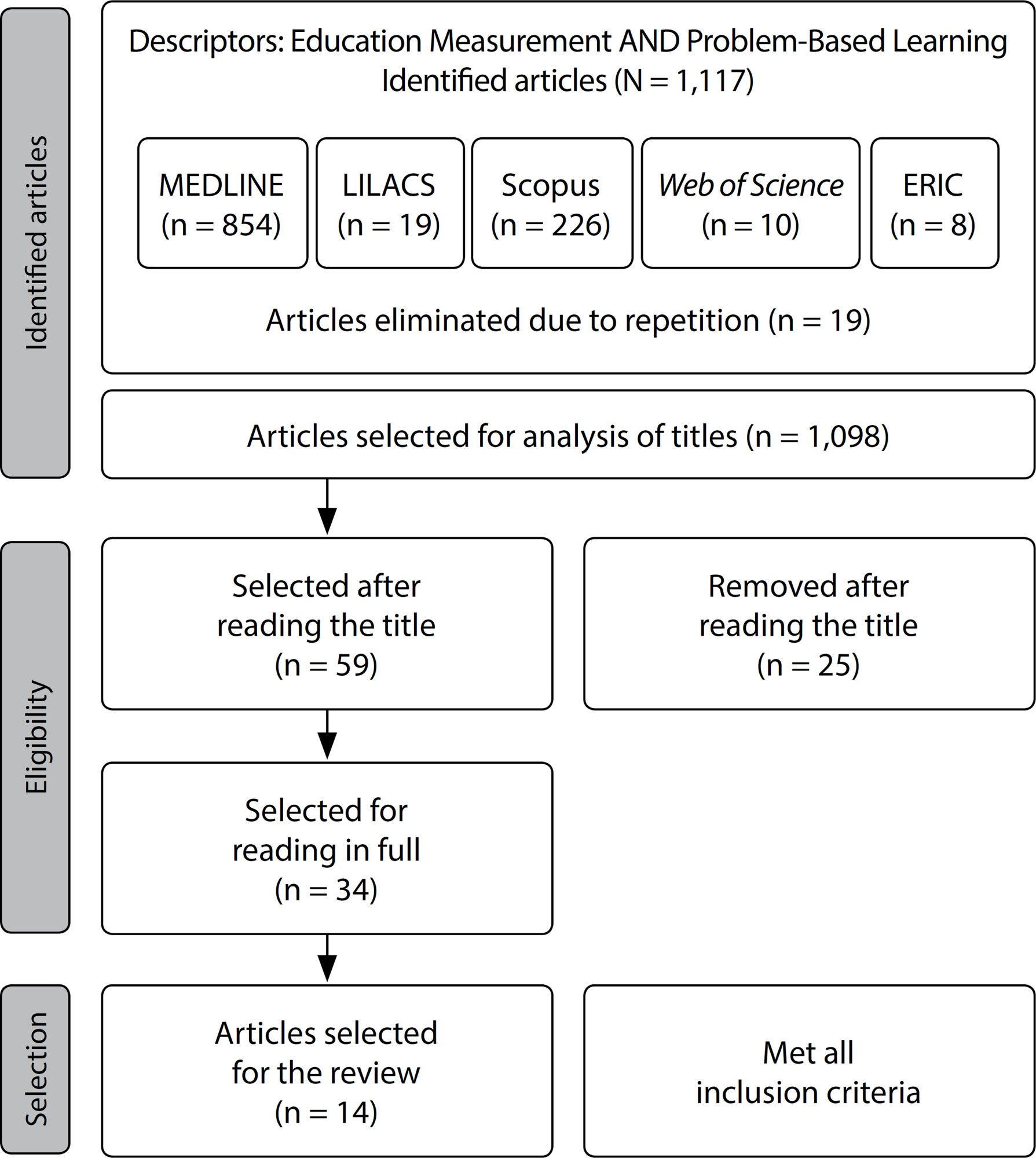-
REVIEW05-21-2021
Evaluation strategies in active learning in higher education in health: integrative review
Revista Brasileira de Enfermagem. 2021;74(2):e20201055
Abstract
REVIEWEvaluation strategies in active learning in higher education in health: integrative review
Revista Brasileira de Enfermagem. 2021;74(2):e20201055
DOI 10.1590/0034-7167-2020-1055
Views0See moreABSTRACT
Objectives:
to analyze scientific evidence on evaluation strategies for active learning methods in health undergraduate programs.
Methods:
integrative literature review in the Medical Literature Analysis and Retrieval System Online, Latin American and Caribbean Literature in Health Sciences, Nursing Database, Scopus, Web of Science and Education Resources Information Center databases.
Results:
different evaluation strategies are used: Presentation of seminars, Self-evaluation, Evaluation of student performance in Tutotest-Lite tutoring, Peer Evaluation, Active Learning and Critical Thinking Self-evaluation Scale, Objective and Structured Clinical Exam, Portfolio, Progressive Disclosure Questions, Modified Dissertation Questions, Progression Test, Dissertation Test, Objective Test, Immediate Learning Checks, Clinical Case Resolution and Cumulative Test.
Final Considerations:
evaluation strategies in active learning are used in combination, aiming at the affective, cognitive and psychomotor development of the student. However, studies with greater power of scientific evidence would be needed.

-
ORIGINAL ARTICLE03-24-2021
Development, validation and application of clinical simulation scenarios for assessment of stomatherapy specialists
Revista Brasileira de Enfermagem. 2021;74(1):e20200360
Abstract
ORIGINAL ARTICLEDevelopment, validation and application of clinical simulation scenarios for assessment of stomatherapy specialists
Revista Brasileira de Enfermagem. 2021;74(1):e20200360
DOI 10.1590/0034-7167-2020-0360
Views0ABSTRACT
Objectives:
to build and validate three clinical simulation scenarios and report the application with candidates for the specialist’s degree in stomatherapy.
Methods:
methodological study, building three scenarios and evaluation checklists; content validation with judges, using content validity index and Modified Kappa Coefficient; pre-test and application.
Results:
scenarios built based on nursing care for: 1. insufficiency and venous ulcer; 2. demarcation of intestinal stomia; and 3. Clean intermittent catheterization. In the content validation of the 24 items appreciated, 83%, 80%, and 92% were validated without change. In the pre-test, the objectives and checklists were adjusted. In the application, to standardize the evaluation, actors and evaluators were trained previously, and each candidate passed the three stations.
Conclusions:
scenarios built and with validated content, based on evidence and covering the three areas of stomatherapy. The pre-test allowed for adjustments in the scenarios, and the candidates achieved the expected objectives.
Keywords:Educational AssessmentNursing EducationPatient SimulationSimulation TrainingValidation StudiesSee more -
ORIGINAL ARTICLE12-21-2020
Four levels of evaluation nurse training program on regional food
Revista Brasileira de Enfermagem. 2020;73:e20190745
Abstract
ORIGINAL ARTICLEFour levels of evaluation nurse training program on regional food
Revista Brasileira de Enfermagem. 2020;73:e20190745
DOI 10.1590/0034-7167-2019-0745
Views0See moreABSTRACT
Objectives:
to verify the effectiveness of a regional nutrition training program for nurses based on four levels of assessment: response, learning, behavior, and conclusions.
Methods:
this was a longitudinal, almost experimental before and after type of study, carried out in 2014 with eight nurses and 62 mothers attended in the Primary Health Care Units of the rural area of Ceará, Brazil, in a training program using educational technology on regional food.
Results:
the evaluations showed a positive reaction from the nurses; a very good post-test average (92.3%); a change in nurses’ behavior, verified by 30 educational activities after training; and satisfactory results, verified by improvement in knowledge, attitude and practice of the mothers about regional food and food safety after participating in the educational interventions carried out by the trained nurses.
Conclusions:
the training program was considered effective, showing positive results in the four levels of evaluation.
-
ORIGINAL ARTICLE02-01-2019
Analysis of the reaction and behavior of nurses after training on young child feeding
Revista Brasileira de Enfermagem. 2019;72:197-203
Abstract
ORIGINAL ARTICLEAnalysis of the reaction and behavior of nurses after training on young child feeding
Revista Brasileira de Enfermagem. 2019;72:197-203
DOI 10.1590/0034-7167-2017-0529
Views0See moreABSTRACT
Objective:
to assess the reaction and behavior of nurses after training on the use of educational tool to promote heathy nutrition to children.
Method:
pilot assessment study, of descriptive and quantitative approach, carried out in 2014 with eight nurses from the rural area of Ceará, Brazil, by observing a training workshop on the use of the serial album "Alimentos regionais: promovendo a segurança alimentar na promoção da alimentação infantil saudável" [Regional food: promoting food safety through child healthy feeding].
Results:
the analysis of the reaction of nurses to the workshop showed that all of them (100%) were satisfied with the training. In behavior analysis, more than a half of the nurses have achieved the expected performance when implementing the illustrations of the serial album, seven of them (87.5%) being considered able to use the serial album.
Conclusion:
the training was considered effective, as all the participant nurses were satisfied and most of them considered capable of using the educational tool in promoting child healthy feeding.

-
RESEARCH01-01-2017
Health education with older adults: action research with primary care professionals
Revista Brasileira de Enfermagem. 2017;70(4):792-799
Abstract
RESEARCHHealth education with older adults: action research with primary care professionals
Revista Brasileira de Enfermagem. 2017;70(4):792-799
DOI 10.1590/0034-7167-2016-0349
Views0See moreABSTRACT
Objective:
To assess the development and implementation of permanent education action.
Method:
Quantitative-qualitative research based on action research in three phases (diagnosis of reality, implementation of activity and evaluation), performed with health professionals and managers of basic health units. The evaluation was on the perception of changes immediately following the activity and after 120 days.
Results:
In the first phase, 110 professionals took part, 36.4% of whom indicated the existence of groups for older adults at work. In the second phase, 98 professionals participated, pointing out interferences of the group in the life of older adults, items of importance and facilitation in forming groups and developing reality-based activities. The third phase showed, in the quantitative analysis, positive impact of the training, and in the qualitative analysis, reassessment of groups, greater knowledge and confidence in managing groups and increased respect for older adults.
Final considerations:
Permanent education opens pathways for the construction of differentiated care for older adults based on respect and health promotion.




